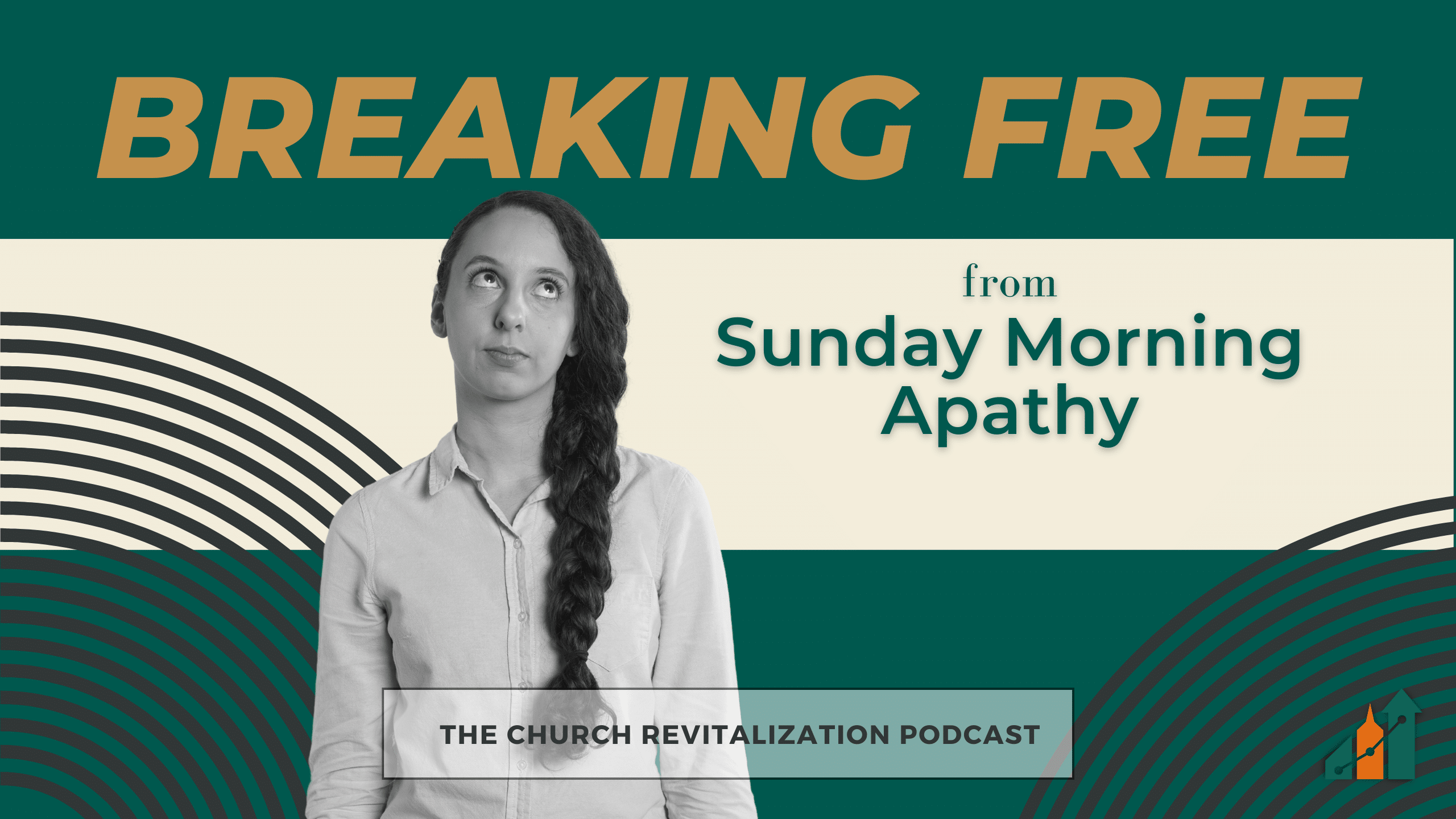The Church Revitalization Podcast – Episode 188
Have you ever looked around your worship center on a Sunday morning, and people aren’t singing along? Or noticed people scrolling their phones during your sermon? Or–the absolute worst–seeing someone start to doze off while you’re preaching? Everyone gets distracted from time to time, but if you’ve noticed a growing sense of apathy from your congregation on a Sunday morning, it’s time to fix it.
Before we dive into the three practical steps you can take to break free from apathy in your Sunday morning worship, we need to address some false assumptions. First, apathy isn’t necessarily more common in churches that are “traditional” or have a highly liturgical background. Or, if apathy has crept into these churches, the liturgy itself isn’t to blame. I’ve seen just as much apathy in a “contemporary” service as I have in any traditional church. Traditional churches may have challenges, but apathy and boredom are not necessary costs of a traditional approach to worship.
Subscribe below to never miss an episode.
Secondly, simply “mixing things up” and doing things differently for the sake of being engaging is unlikely to be helpful. I recently attended a church that takes communion every Sunday as part of their tradition. In an attempt to keep the sacrament from becoming too ritualistic, they decided to change up how they presented communion. On the particular Sunday that I observed, they were supposed to include communion as part of the final song before the sermon.
Unfortunately, no one fully understood what was supposed to happen because no one really explained it. As a result, people were never sure when they were supposed to take the elements. And guests were especially confused. I feel certain that when they planned out the worship service in advance, this isn’t what they envisioned. However, this is often the unintended consequence of changing things up merely for the sake of doing things differently.
Apathy isn’t rooted out by change. Apathy is the consequence of a lack of an emotional and spiritual connection. So, while planning plays a key component in combatting apathy, we’ll explore how the solutions to apathy in your Sunday services require a response at the emotional, spiritual, and relational level. There are three key ways to break free from apathy in your Sunday worship: improving communication, planning with intentionality, and infusing authenticity.
Improving Communication
Most people don’t fully understand why worship, and the individual components of our worship service, are so important. They maybe understand that going to church is important, or they understand that they feel some benefit in their spiritual life when they are engaged in church. But they don’t fully comprehend the purpose of praise, communion, giving, or the preaching of the Scriptures. Even people who have attended church their whole life and have some measure of understanding are likely to forget, get distracted, or lose sight of the importance of our worship.
Therefore, one of the most important things you can do each week is communicate regularly and differently about the importance of worship. This doesn’t mean having a script for each week that says, “Now it’s time for us to pray. We pray because prayer is how we speak to God and allow Him to speak to us.” Rather, think through different ways you can talk about prayer, especially in the context of what’s happening in the whole service.
Additionally, every Sunday is someone’s first week. A person who is new to your church or new to the faith won’t know the in’s and out’s of how you “do” church. Being thoughtful about how you speak about your worship during your worship is critical for helping those who are new to feel engaged and connected rather than bored or distracted. The side benefit is that even those who come weekly will have constant reminders about why the elements of your worship are essential to their growth in Christ.
Planning with Intentionality
Most of the church services I’ve attended in my years of consulting feel disjointed. It seems like the worship director made his plans, the pastor wrote his sermon, and the other up-front components (like announcements, prayer, or offering) are thrown together on Sunday morning. Then, everyone says a prayer and hopes the service goes smoothly. In fact, I suspect this is what drives many churches that aren’t required to follow a specific liturgy to get stuck in a weekly template: it minimizes mistakes and is easier to pull together.
But what if your church could stop winging it on Sunday? What if the worship service felt like an integrated whole? I’ve written in the past about developing a planning rhythm for strategy. But the same principle applies to a planning rhythm for worship. If you are in charge of leading a weekly worship service, you should be having a weekly creative planning meeting with the key leaders in charge of the service (usually the pastor and worship leader).
Even if you’re bi-vocational or have a volunteer worship leader, it’s possible to have a weekly meeting. These meetings don’t have to be long. I used to run a meeting like this that happened at 7am at a McDonald’s on Tuesday’s. Our worship leader was very part time, and had a regular job. But we prioritized that meeting so that our weekly worship service was planned with intentionality. That meant that every component from the song selection to how we planned the sermon response time was planned and integrated.
Your worship service is not a concert or a production. But it is intended to help people glorify God and obey His Word. I fail to understand how churches somehow deceive themselves to think that if they put minimal effort into the coordination and planning of the service as a whole, that it is more holy. It’s not. Poorly planned worship services are distracting.
Finally, respect people’s time. Know how long the music will go, how long the sermon will go, how long the video will play, etc. Then, hit those times as best as you can. There are some cultures that place a low priority on timeliness. In these instances, you can disregard this advice. But for the majority of Western cultures, punctuality is a high value. Running over on time is a great way to encourage apathy to creep in. When you execute your worship plans well, people are much more likely to engage and pay attention.
Infuse Authenticity
The word authenticity has lost a lot of its meaning in recent years. It’s a buzz word. But the concept is so important when it comes to breaking free from apathy in your Sunday morning worship. If you’ve ever attended a worship service that was clearly well-planned, but it still felt like you couldn’t connect at an emotional level, I would contend that the problem is a lack of humanity or authenticity.
Before you accuse me of making an opposite point to “planning with intentionality,” I want to point out that “authenticity” and “planning” aren’t contradictory.
When I speak on Zoom with churches about our Strategic Envisioning or Leadership Pipeline processes, I largely know what I’m going to say. I’ve had a lot of these conversations, and I know how to communicate what it is we do in ways that people understand. Also, unless the meeting is fairly last-minute, I will have done my best to familiarize myself with your church. I’ll have gone onto your website and social media pages. I’ll try to understand what your church is like and try to make some guesses as to the pain points you might be experiencing.
However, when you and I get on a discovery call, it’s not a performance. Yes; I have an agenda. I want to show you how we can serve your church (I’ll tell you the truth if I don’t think we’re the right partner, too). But I also want to make a genuine, human connection with you. It’s not an act. I genuinely care about you and your church. I can have done all of my homework on your church and have all the right words, but if I can’t connect with you at the human level, it’s unlikely that we’ll work together. This is why I hate phone calls. We were hosting discovery meetings on Zoom before it was cool. I want to read your eyes, see your facial expressions, and genuinely connect with you. It’s not put on in any way. It’s real. If you’re a church that’s worked with me, I’d hope you could attest to this.
I say this because I firmly believe that the number one reason that apathy grows in a Sunday worship service is because somewhere in the gap between the edge of your stage and the front row of pews, the human connection gets lost. Pastors feel like they’re speaking to the whole room rather than to the man sitting in row three, or the teenager on the back right row. You have to take all of your plans and infuse your humanity into them.
Whether you’re the worship leader, pastor, or the host doing announcements, people need to feel connected to you at a relational level. Much can be said about tonality and presence. To be certain, there are skills associated with worship leading and speaking that can be learned. But at the end of the day, the most important thing is your ability to stay in-the-moment and in-connection with the people you are leading in worship and the Word.
Authenticity doesn’t mean “appearing to be relevant.” It means mirroring the incarnational approach to ministry that Jesus gave to us, even when we’re up on a platform in front of dozens, hundreds, or thousands.
Apathy is growing in the church because distractions are multiplying. There was a day and time when the most urgent distraction for teenagers during a worship service was passing notes on the back of offering envelopes. Today, people have digital access to anywhere in the world while sitting in your congregation. Therefore, it’s important that you prioritize engaging people in your church–not with a better production, but with an authentic human connection that leads them to a transcendent experience of Jesus’ truth and grace.
BONUS: Watch this episode on YouTube.


Scott Ball is the Vice President and a Lead Guide with The Malphurs Group. He lives in East Tennessee with his wife and two children. (Email Scott).

